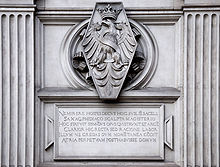
Back ثقافة بولندا Arabic ཕོ་ལན་གྱི་སྒྱུ་རྩལ། BO Kultur in Polen German Πολιτισμός της Πολωνίας Greek Kulturo de Pollando EO Cultura de Polonia Spanish Puolan kulttuuri Finnish Culture de la Pologne French Լեհաստանի մշակույթ HY Cultura polacca Italian
This article needs additional citations for verification. (March 2022) |

| Part of a series on the |
| Culture of Poland |
|---|
 |
| Traditions |
| Mythology |
| Cuisine |
| Festivals |
| Religion |
The culture of Poland (Polish: Kultura Polski) is the product of its geography and distinct historical evolution, which is closely connected to an intricate thousand-year history.[1] Poland has a Roman Catholic majority, and religion plays an important role in the lives of many Polish people.[2] The unique character of Polish culture developed as a result of its geography at the confluence of various European regions.
It is theorised and speculated that ethnic Poles are the combination of descendants of West Slavs and people indigenous to the region including Celts, Balts and Germanic tribes which were gradually Polonized after Poland's Christianization by the Catholic Church in the 10th century. Over time Polish culture has been profoundly influenced by its interweaving ties with the Germanic, Baltic, Jewish, Latinate and to a lesser extent; Byzantine and Ottoman cultures as well as in continual dialogue with the many other ethnic groups and minorities living in Poland.[3]
The people of Poland have traditionally been seen as hospitable to artists from abroad and eager to follow cultural and artistic trends popular in other countries. In the 19th and 20th centuries, the Polish focus on cultural advancement often took precedence over political and economic activity. These factors have contributed to the versatile nature of Polish art, with all its complex nuances.[3] Nowadays, Poland is a highly developed country that retains its traditions.
Poland has made significant contributions to the art, music, philosophy, mathematics, science, politics and literature of the Western World. The term which defines an individual's appreciation of Polish culture and customs is Polonophilia.
- ^ Adam Zamoyski, The Polish Way: A Thousand Year History of the Poles and Their Culture. Published 1993, Hippocrene Books, Poland, ISBN 0-7818-0200-8
- ^ GUS. "Infographic - Religiousness of Polish inhabitiants". stat.gov.pl. Retrieved 22 August 2023.
- ^ a b Ministry of Foreign Affairs of Poland, 2002–2007, An Overview of Polish Culture. Retrieved 13 December 2007.